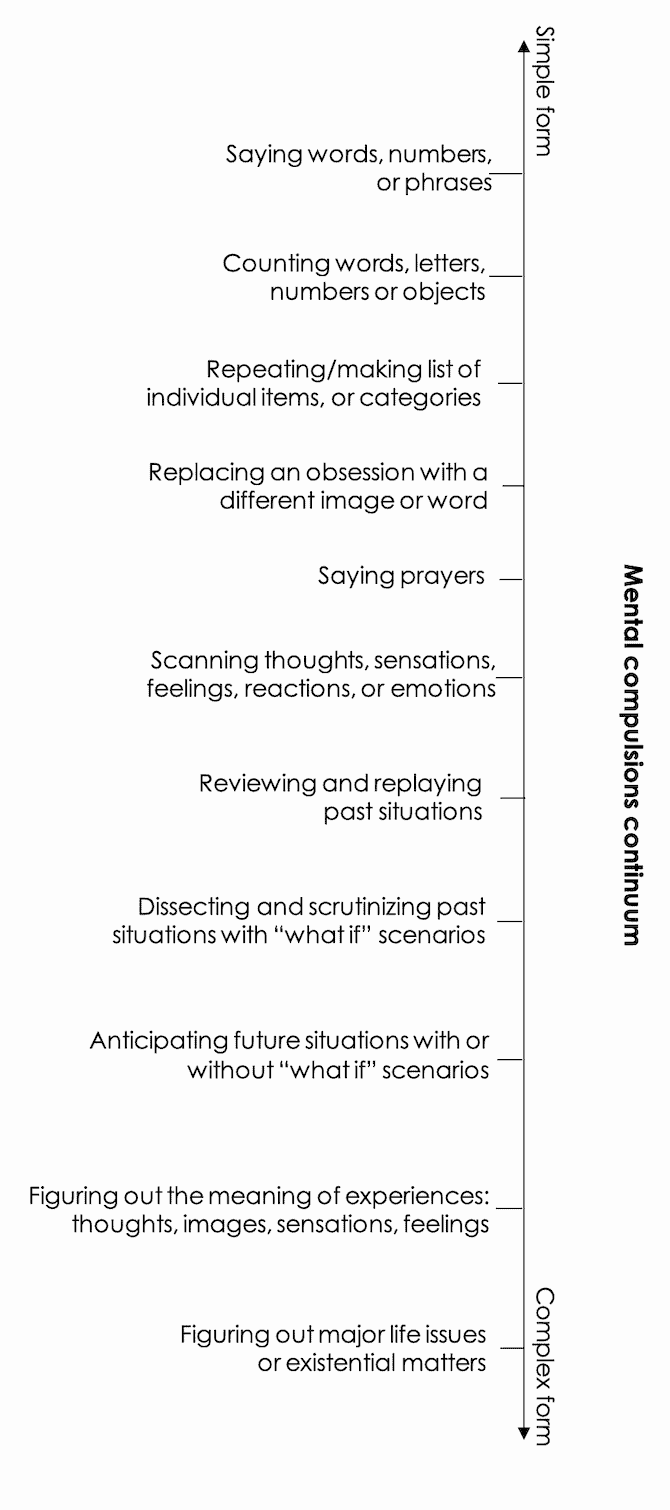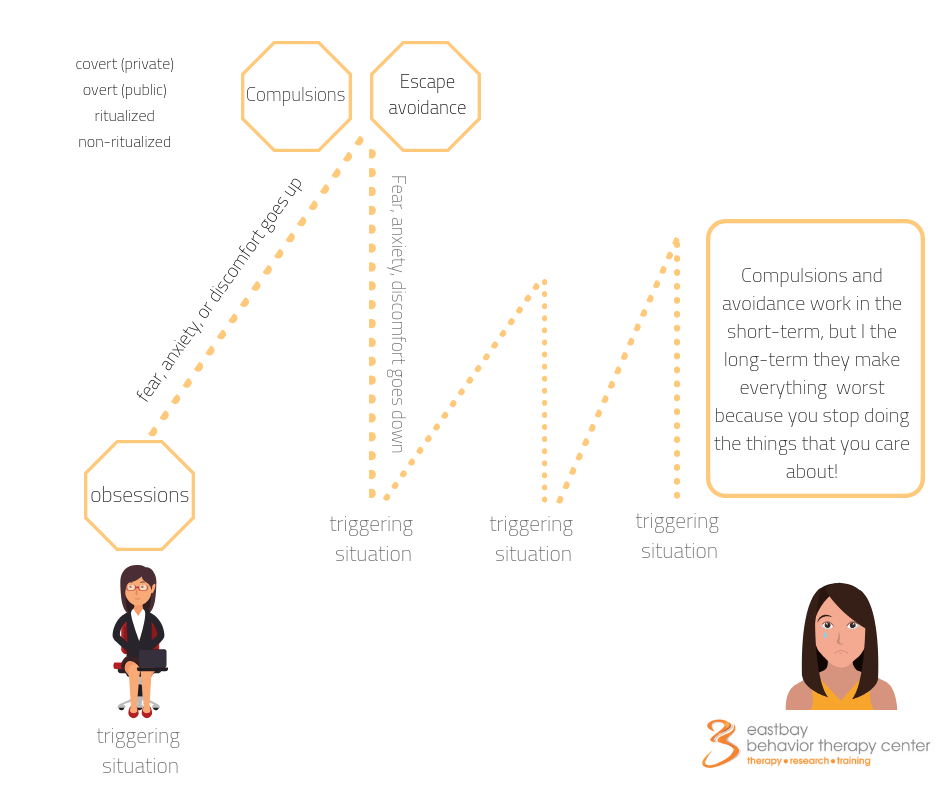TYPES OF MENTAL COMPULSIONS
A clarification about the different types of mental compulsions
Private compulsions are less easily identifiable than public ones primarily because they’re so well hidden. However, even if they’re talked about aloud (eg “Did I do anything that put my daughter in danger when she was a baby?”) they can look like regular forms of thinking to any person. However, they are compulsions because they perpetuate the cycle of OCD episodes.
Our brain is designed to analyze, explain, make sense, create coherence, and search for meaning. No wonder why the popular expression of “I think, therefore I am” became so popular.
When going over this list of mental compulsions, keep in mind that all of them are regular thinking strategies we all do. However, when having a reactive brain that excels in creating content and coming up with thinking patterns, it’s easy to get lost in compulsively thinking over and over, compulsively going into answer seeking, and compulsively searching for the “right feeling.”
Mental compulsions are mental actions that vary from simple to complex; they’re equally distressing to public compulsions, can be triggered by any type of obsession, and serve the purpose of getting rid of the fear, terror, and dreadful feelings, even just for a little bit.

All forms of OCD are maintained by avoidance and compulsions

saying words, numbers, or phrases
What is it?
With this form of mental compulsion, the content of the words, phrases, and numbers doesn’t matter: sometimes they’re sensical, sometimes they’re not.
How it looks?
Eric gets caught up in an obsessive thought of becoming an evil character in a movie. To neutralize this obsession, he tells himself, “I’m taking my power back; this is not real.” Other times, he tells himself only the word “power.”
Lourdes struggles with the intrusion of contracting AIDS and gets easily triggered after touching a person’s hand. She compulsively counts numbers in her head, like bingo balls, until she ends on an even number, which feels right to her.
To minimize her anxiety about making mistakes, Lisa tells herself “Knock it out of the ballpark” when she gets caught up in the fear of making errors.
counting words, letters, words, numbers, or objects
What is it?
This compulsion involves counting. This can be counting letters, words, numbers, the first letter of a word, the times a bodily function happens, or anything the brain decides to latch onto.
How it looks?
Charlie has a fear of mixing bad energies with good energies and attracting bad things to him. When having a bad vibe about a person, he “counts” all the experiences with positive vibes, to make sure they are even (not odd).
repeating/making lists of individual items or categories
What is it?
This compulsion is all about mentally creating lists of anything and everything, with the purpose of getting rid of obsessions (temporarily).
Another form of this compulsion is making lists of categories: good vibes, bad vibes, good prayers for home, bad prayers at work, good prayers at school, and so on.
How it looks?
Sidney creates a mental list of specific dates in the year for birthdays and important family events, and the “right books to read” that are associated with good energy. If any of those dates, or books don’t have a good feeling, he cannot read them or will have to start repeating the list until it feels right to start a new one, with new dates or new book titles.
Tax is afraid of being a bad person for not defending his sister from being bullied at school. He compulsively makes lists of all the people that have offended her and says, “You’re bad,” and quickly feels better, as if he is taking action.
replacing an obsession with a different image or word
What is it?
To neutralize an unwanted or scary obsession, the compulsion is to replace it with a positive image, feeling or word.
You may try to neutralize “bad, negative” thoughts with the same number of “good” ones.
The purpose is to reduce the anxiety that comes with the yucky obsession.
How it looks?
Fletcher is hooked on the obsession that his partner will cheat on him. When feeling petrified by this obsessive thought, he quickly thinks of and replaces it with a positive encounter he has had, recently or in the past.
saying prayers
What is it?
Saying prayers as part of living your faith is quite different than saying them to remove anxiety from your obsession.
A challenge with this compulsion is that it’s hard for people to distinguish between the natural discomfort that comes from not following your religious principles and the discomfort that comes with a blasphemous obsession, because both feel awful.
Private mental compulsions include praying for forgiveness, saying prayers until they feel right or reach a lucky number, and making amendments with God.
How it looks?
Phillip identifies as Christian and is petrified at the possibility of attacking his relatives because of violent images he saw when watching a movie with them. When Philip gets hooked on this obsession, he quickly says this prayer: “God exists, God knows I’m a good person, God knows I wouldn’t do that.”
Hayley has obsessions about her sexual orientation: “Don’t you like her? Are you gay?” She’s scared that if she doesn’t try to deny those thoughts, it proves she’s a lesbian. As a result, when triggered, she intentionally thinks about all the guys she likes and feels attracted to, prays, and specifically says, “God, you know, it’s not me.”
scanning thoughts, sensations, feelings, reactions, or emotions
What is it?
To reduce your anxiety, you check the quality of all your private experiences and make sure they are the “right way.”
This compulsion could also apply to checking your obsessions: “Am I obsessing? Do I have an obsession? Is this an obsession?”
Sometimes people may check for particular thoughts to make sure that the “thought is under control,” so they don’t do anything inappropriate or inconsistent with their character.
How it looks?
Let’s continue with Hayley from the above example. When having a groinal reaction, she checks if that reaction is appropriate or not. “Is it strong? Did I like it?” Based on her responses, she feels reassured or engages in other compulsions.
reviewing and replaying past situations
What is it?
Some people refer to this form of compulsion as rumination, and sure that makes sense, because you’re dissecting past events. But this type of mental compulsion differs because you’re reviewing past events to answer a question, to make sure you didn’t do anything relating to the obsession you’re dealing with, and to get rid of the fear, nervousness, and distress that comes with the obsessions (e.g., mentally saying, “I think I actually wanted this, I think I said this”).
If people are in the process of recalling a past situation and they get interrupted, or have a wrong feeling when doing this compulsion or perceive that they didn’t reply to the situation correctly, they may take the obsession as being the truth.
When holding the obsession as fact (e.g., assuming that you did make sexual moves toward your children and having an urge to turn yourself into the police), people may quickly engage in other types of compulsions and also end up questioning their character, intentions, and values (e.g., “Did I have an ulterior motive to do that? Did I mean to do that?”).
How it looks?
Geoff is tortured by obsessions about “hitting people when driving without realizing it.” So he avoids crowded streets, driving at night, and driving around school zones, stadiums, and major shopping areas. After driving, Geoff mentally reviews how he drove around pedestrians in the streets of a city: “I drove slowly on the right side of the street, saw a woman with a red sweater, looked at the light, checked both sides of the road before continuing driving …” and so on.
Kim feels terrified when buying into the obsession of doing something immoral (e.g., cheating on college tasks). When triggered, she ends up mentally checking how she behaved during a test or an academic task: “Did my eyes land on another person’s work? Was I looking only at my work? When I asked my classmate to hand me the book, did I do anything else?”
dissecting and scrutinizing past situations with potential what-if scenarios
What is it?
Dissecting past situations as a compulsion can also include revisiting them with what-if situations, by checking over and over how you would have handled yourself in each one of those scenarios, to neutralize the obsessions.
As with any form of compulsion, you keep dissecting past events and scrutinizing every potential scenario until your anxiety gets relieved. It’s possible that you may feel reassured after checking how you would have handled three scenarios (vs unlimited ones), but you may feel worse if you aren’t able to validate past scenarios right away, and so you continue waiting and waiting or start another compulsion.
How it looks?
Geoff sometimes replays how he drove; this makes him feels better afterward. Other times, replaying his driving doesn’t feel right enough, and so he dissects it bit by bit: “Did I stop the car when I saw that pedestrian? Did I look in the rear-view mirror? Did I see those teenagers on the other side of the street before driving?”
Other times, Geoff takes this mental reviewing one step further by imagining how he would have handled other driving situations.
Situation 1: “If the teenagers didn’t make it to the other side of the street, I’d know by now, because everyone would be screaming on the streets and I would have heard that.”
Situation 2: “If I didn’t look at both sides of the street before driving and I hit someone, it would show up in the news or in the police reports. I need to check their website, to make sure I didn’t cause harm and didn’t endanger anyone today.”
And that’s what Geoff did. He checked the police website for more than a week. He also paid attention to the news, and even asked his sister to drive with him in that area in case there was any sign of an accident.
Geoff felt like he was losing his mind while living a chain of compulsions.
anticipating future situations with or without potential what-if scenarios
What is it?
There is a difference between considering how your future may look (e.g., preparing for a trip, planning your wedding, getting pregnant, and so on) versus foreseeing or predicting the future, with the aim that an obsession doesn’t occur or to prove it wrong.
When relying on this form of private compulsion, you may mentally do two things:
(1) Go into prediction mode of a future scenario to reassure yourself of a particular outcome, usually a positive one.
(2) Take it a step further, and attempt to identify potential scenarios that may show up and how you may respond to each one of them while still trying to get reassured.
How it looks?
When Frederik takes his mind very seriously, he gets terrified at the obsession of contracting MS.
To make sure he’s not putting himself at risk by dismissing this possibility and then regretting having MS, he spends hours researching the best MS doctors in the area and thinking about what he needs to tell the doctor to make sure he explains his symptoms correctly and targets them.
Frederik also struggles with sexual obsessions involving children. To minimize the dread that comes with this obsession, he mentally imagines different types of scenarios with his nephews when celebrating Thanksgiving as a way to anticipate whether he may be aroused or not.
figuring out the meaning of internal experiences such as thoughts, images, sensations, and feelings
What is it?
This is another common form of mental compulsion and, as its name indicates, it’s all about mentally solving, concluding, and answering to the content of an obsession.
In my opinion, any form of figuring out an obsession usually comes with “mentally scanning” your experiences, too.
How it looks?
Jaime gets caught up with obsessions about committing suicide.
When feeling low or having a change in her mood, Jaime often reviews how she feels throughout the day. She ponders whether those feelings are similar or different than the day before, and checks the potential reasons why she may feel the way she does. She does all these things to make sure she’s not at risk of committing suicide.
figuring out major life issues or existential matters
What is it?
Any form of reflections, contemplations, or deliberations about life matters can easily be a mental compulsion, because they’re done with the purpose of neutralizing a pesky obsession, regardless of its content –religion, sexuality, meaning of life, life after death, etc.
How it looks?
Walter is reading a story on Facebook about a man’s diagnosis of pancreatic cancer. He suddenly gets hooked on the obsession “What if that’s me? I can have pancreatic cancer.”
Walter can’t let go of this thought and finds himself pondering endlessly about aging, dying, and the afterlife: “What happens after you die? Where do we go? Do we have life afterwards? Do we know? Do we feel love? is it over? And, if this life is over, how is it to feel ‘nothingness’?”
What if most of the chaos in your mind goes to the background by learning research-based life skills and getting clear about what matters to you?
Subscribe to my monthly newsletter playing-it-safe.
Get real, practical, and research-based skills to stop "playing-it-safe" and get unstuck from worries, fears, anxieties, obsessions, and panic.
Frequently asked questions about ACT beyond OCD
What is OCD?
Are there different types of OCD?
How do I know I'm doing mental compulsions?
Why is it so hard to let go of obsessions?
Are there memoirs about OCD that I can read?
